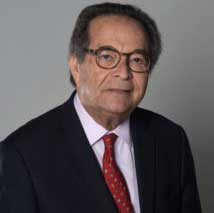SIMON BOLIVAR Has he returned to Bolivia?

By: Luis Beltrán Guerra G. - 26/10/2025
Share:
History is conceived as "the narration and exposition of past events worthy of remembrance, whether public or private." Mention is also made of the term "historiography," coined by the Italian philosopher and poet Tommaso Campanella to describe "the art of writing history correctly."
The prominent Bolivian politician, Carlos Sánchez Berzain, Founding Director of the Inter American Institute for Democracy, maintains that “on October 17, 2003, the constitutional president of the Republic of Bolivia, Gonzalo Sánchez de Lozada, and his coalition government were violently overthrown,” which led to a country without democracy, without a republic, and without sovereignty, and to the transformation of Bolivia into a “dictatorship and narco-state.” Bolivia, therefore, has not escaped the customary methodology of “military arbitration,” whose source in Latin American jargon is also identified as “madrugonazo,” an invention that has distorted democratic processes, practically transforming them into “dictatorships.”
Bolivians, fortunately, seem to be moving toward a democratic methodology, whose essence, as we know, lies in the will of the people. This has been expressed with the recent election of Rodrigo Paz as President, son, incidentally, of Víctor Ángel Paz Estenssoro, who served as president of the country four times. The newly appointed president proposes "capitalism for all," an end to "state bureaucracy" (which he calls "the locked-up state"), and proper regionalization.
Paz's victory, as we read, opens a new political cycle in Bolivia. He takes office, as we read, with a government proposal that seeks to distance himself from extremes. One of his slogans is "capitalism for all," putting an end to the so-called "Machiavellian state," deepening regional autonomy. He also believes that the reopening of relations with the United States, suspended since 2008 by Evo Morales, will undoubtedly constitute a rapprochement with multilateral organizations. The country demands balance, listening to one another, reaching consensus, but doing so firmly. We represent national, popular, and democratic values. Bolivia is a diverse country, where people understand that ideologies are not what you eat, but what you work and produce. Socialism leaves us with an immense debt. It could therefore be said that hope for a modern republic has been reborn in Bolivia.
In an interesting study by Zenaida Guánchez de Méndez, entitled "Simón Rodríguez, the Constitution of 1826, and the Popular Education Project" (Chair: Simón Rodríguez, Faculty of Humanities and Education, Central University of Venezuela), the "Hispanic-American independence movement" is described as an exercise of "political will" seeking to incorporate rationality into political institutions, as has occurred from Greece to the present day, for the sake of their efficiency and credibility. For the scholar, this is evident in the intellectual effort made by Simón Bolívar to configure an institutional project that was sufficiently plausible for Bolivia, based on rationalism and the current historical peculiarities. The author mentions the need for "a constitutional order" in keeping with the Spanish-American scenario, which, with its serious dissimilarities, made it difficult to apply constitutional formulas from other latitudes. Both the Liberator and Simón Rodríguez, and those who, therefore, were determined to take into account the uniqueness of the Spanish-American peoples, remain in agreement.
The professor considers the fact that Rodríguez stated, "Where shall we go to look for models? Spanish America is original, so its institutions and government must be original, and so must the means of founding both. We either invent or we fail," as evidence that both figures undoubtedly shared the need for "original political institutions." A decisive conviction, without a doubt.
This essay, dear reader, seeks to highlight Simón Bolívar's heroic deeds for Bolivia, the country for which he drafted its first constitution. Indeed, it reads, "The Political Constitution of Bolivia of 1826, also known as the 'Bolivarian Constitution,' was the first constitutional text drafted by the Liberator. It was also approved by the General Constituent Congress on November 6, 1826. However, another evidence of the Venezuelan identity of that time reveals that it was promulgated by Antonio José de Sucre on November 19 of that year."
That is why we express our satisfaction with Bolivia's return to democracy. We dare not claim that this is a matter of "synchronicity," the science behind "significant coincidences," to which William Blake seems to refer: "To see the world in a grain of sand, And Heaven in a wild flower, Hold infinity in the palm of your hand, And eternity in an hour." Additionally, allow us to note that Carl Gustav Jung observed in the coincidences of highly improbable events the expression of a phenomenon that deserved to be studied with rigor.
Let us therefore ask ourselves, in conclusion, whether the title we use, "Simon Bolivar: Has He Returned to Bolivia?", suggests that we might be dealing with a hypothesis of "synchronicity." The opposing hypothesis is that of those who claim that the alleged similarities between two events are mere coincidence.
«The opinions published herein are the sole responsibility of its author».